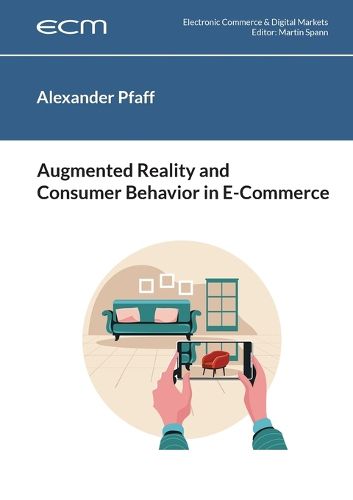Readings Newsletter
Become a Readings Member to make your shopping experience even easier.
Sign in or sign up for free!
You’re not far away from qualifying for FREE standard shipping within Australia
You’ve qualified for FREE standard shipping within Australia
The cart is loading…






This title is printed to order. This book may have been self-published. If so, we cannot guarantee the quality of the content. In the main most books will have gone through the editing process however some may not. We therefore suggest that you be aware of this before ordering this book. If in doubt check either the author or publisher’s details as we are unable to accept any returns unless they are faulty. Please contact us if you have any questions.
Augmented Reality (AR) is an innovative technology to improve product evaluation in e-commerce. It enables online consumers to project virtual product models into their surrounding real-world environment in real time using their mobile devices (e.g., projecting a virtual model of a sofa into its dedicated place in the living room via smartphone). AR can thus facilitate a more realistic online product evaluation and potentially increase sales. However, AR's effectiveness may depend on different usage contexts and product characteristics. The main objective of this cumulative dissertation is to provide a better understanding of AR in e-commerce and resulting consumer behavior. To this end, this dissertation studies context- as well as product-related boundary conditions of AR's effectiveness in online product evaluation, and consumers' underlying psychological mechanisms. The author presents four independent articles, which are nested in a general introduction and conclusion. Methodologically, experimental approaches are pursued that allow for drawing causal conclusions (field, laboratory, lab-in-field experiment, and quasi-experimental analysis of retailer data). The first article is a systematic literature review that establishes the foundation for the dissertation by reviewing consumer responses to AR usage in online and offline settings. The three subsequent quantitative-empirical articles examine the following aspects of AR usage: (1) the influence of the AR usage context on consumer perception of the evaluated product, (2) the role of AR in reducing spatial fit uncertainty in e-commerce, and (3) the effectiveness of AR in transferring implicit knowledge in corporate training situations. The results of this dissertation contribute to digital marketing research and provide actionable recommendations for managers.
$9.00 standard shipping within Australia
FREE standard shipping within Australia for orders over $100.00
Express & International shipping calculated at checkout
This title is printed to order. This book may have been self-published. If so, we cannot guarantee the quality of the content. In the main most books will have gone through the editing process however some may not. We therefore suggest that you be aware of this before ordering this book. If in doubt check either the author or publisher’s details as we are unable to accept any returns unless they are faulty. Please contact us if you have any questions.
Augmented Reality (AR) is an innovative technology to improve product evaluation in e-commerce. It enables online consumers to project virtual product models into their surrounding real-world environment in real time using their mobile devices (e.g., projecting a virtual model of a sofa into its dedicated place in the living room via smartphone). AR can thus facilitate a more realistic online product evaluation and potentially increase sales. However, AR's effectiveness may depend on different usage contexts and product characteristics. The main objective of this cumulative dissertation is to provide a better understanding of AR in e-commerce and resulting consumer behavior. To this end, this dissertation studies context- as well as product-related boundary conditions of AR's effectiveness in online product evaluation, and consumers' underlying psychological mechanisms. The author presents four independent articles, which are nested in a general introduction and conclusion. Methodologically, experimental approaches are pursued that allow for drawing causal conclusions (field, laboratory, lab-in-field experiment, and quasi-experimental analysis of retailer data). The first article is a systematic literature review that establishes the foundation for the dissertation by reviewing consumer responses to AR usage in online and offline settings. The three subsequent quantitative-empirical articles examine the following aspects of AR usage: (1) the influence of the AR usage context on consumer perception of the evaluated product, (2) the role of AR in reducing spatial fit uncertainty in e-commerce, and (3) the effectiveness of AR in transferring implicit knowledge in corporate training situations. The results of this dissertation contribute to digital marketing research and provide actionable recommendations for managers.